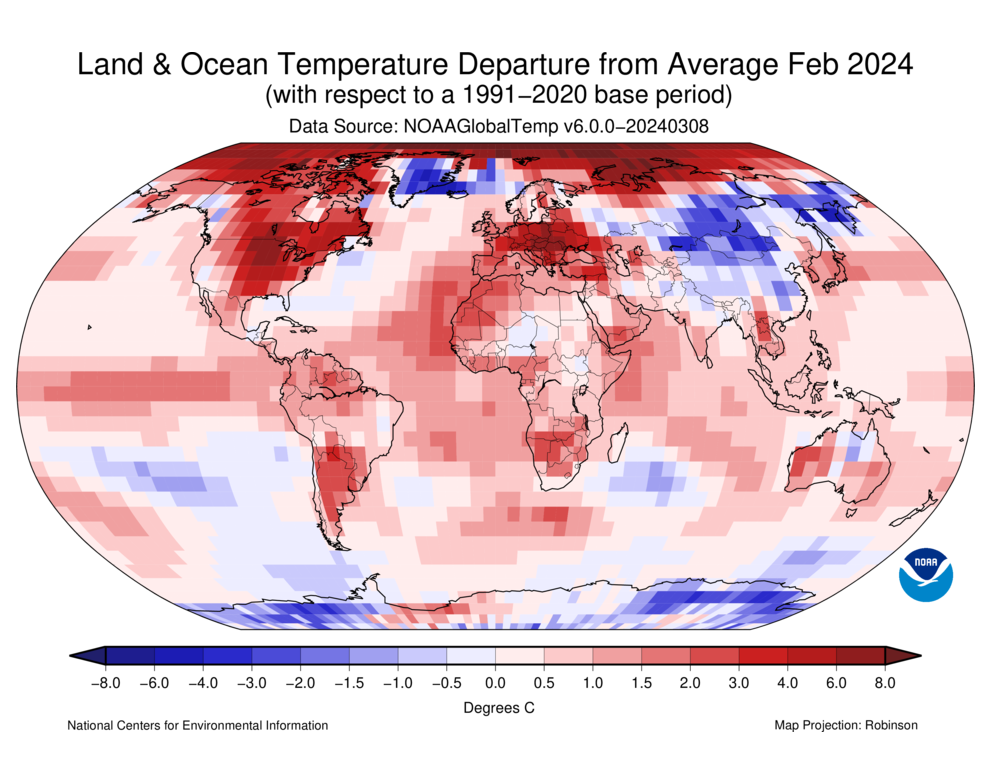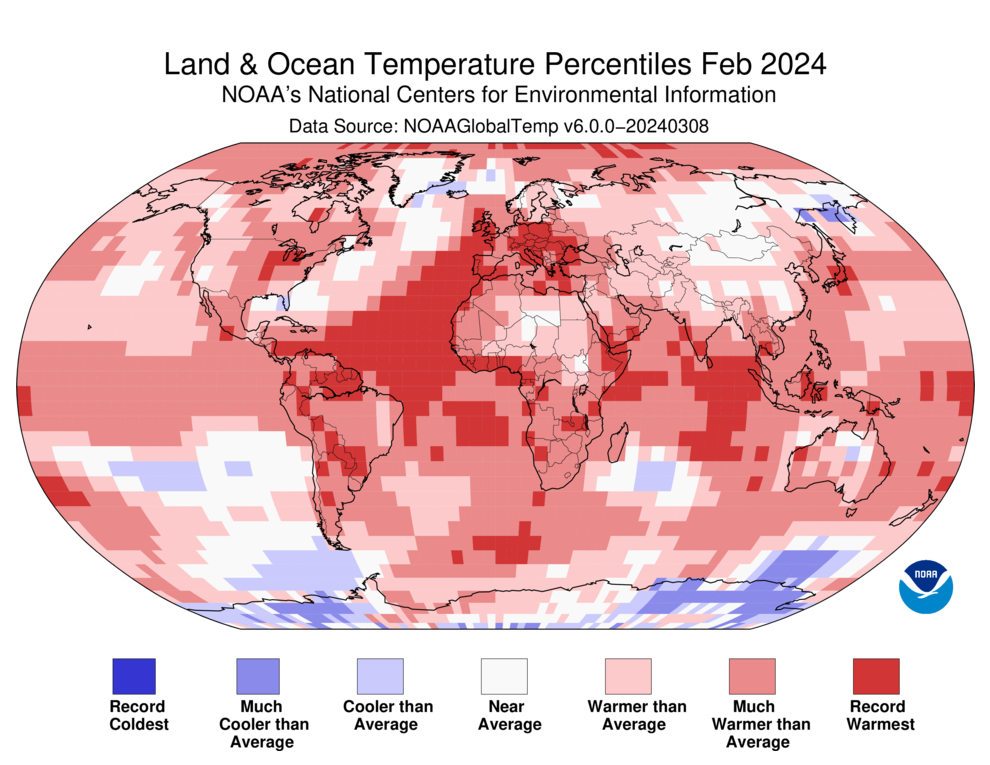-
Happy Birthday ICMag! Been 20 years since Gypsy Nirvana created the forum! We are celebrating with a 4/20 Giveaway and by launching a new Patreon tier called "420club". You can read more here.
-
Important notice: ICMag's T.O.U. has been updated. Please review it here. For your convenience, it is also available in the main forum menu, under 'Quick Links"!
You are using an out of date browser. It may not display this or other websites correctly.
You should upgrade or use an alternative browser.
You should upgrade or use an alternative browser.
Have you looked at the North Pole lately?
- Thread starter igrowone
- Start date
chilliwilli
Waterboy
7:40
February 2024
The February global surface temperature was 1.40°C (2.52°F) above the 20th-century average of 12.1°C (53.8°F), making it the warmest February on record. This was 0.06°C (0.11°F) above the previous record from February 2016. February 2024 marked the 45th-consecutive February (since March 1979) with temperatures at least nominally above the 20th-century average.February had a record-high monthly global ocean surface temperature for the 11th consecutive month. El Niño conditions that emerged in June 2023 continued into February, and according to NOAA's Climate Prediction Center it is likely that El Niño will transition to ENSO-neutral by April-June 2024 (83% chance), with increasing odds of La Niña developing in June-August 2024 (62% chance).
The Northern Hemisphere tied 2016 as the warmest February on record at 1.85°C (3.33°F) above average. The Northern Hemisphere land temperature tied 2020 as the second highest on record while the ocean temperature was again record-high by a wide margin (0.32°C/0.58°F warmer than February 2020). The Arctic region had its third warmest February on record.
February 2024 in the Southern Hemisphere also ranked warmest on record at 0.95°C (1.71°F) above average. The ocean-only temperature for February in the Southern Hemisphere ranked highest on record, while the land-only Southern Hemisphere temperature was 2nd warmest on record. Meanwhile, the Antarctic region had its 54th coolest February, 0.17°C (0.31°F) below average.

February 2024 Blended Land and Sea Surface Temperature Anomalies in degrees Celsius

February 2024 Blended Land and Sea Surface Temperature Percentiles
A smoothed map of blended land and sea surface temperature anomalies is also available.
Temperatures were warmer to much-warmer-than-average across the Arctic with the exception of much of Greenland to northern Iceland, and parts of the North Atlantic. Above-average to much-above-average temperatures also covered almost all of North America, most of western Europe into western Asia, most of South America, Africa and Australia. Record warm February temperatures affected many parts of Europe, South America, and in the southern half of Africa. As was the case in January, sea surface temperatures were again above average across much of the northern, western, and equatorial Pacific Ocean. Record-warm February temperatures covered much of the northeastern and tropical Atlantic Ocean as well as large parts of the Indian Ocean. Record-warm temperatures covered approximately 13.8% of the world's surface this February, which was the highest percentage for February since the start of records in 1951, and 7.4% higher than the previous February record in 1986.
Near-average to cooler-than-average temperatures covered much of central and eastern Russia, Mongolia, large parts of China, some areas in northern Australia, and parts of Antarctica in February. As they were in January, sea surface temperatures were again near to below average over parts of the southeastern Pacific Ocean, the southern Ocean, and southwestern Indian Ocean as well as over parts of the Gulf of Mexico and northwestern Atlantic Ocean. Zero percent of the world's surface had a record-cold February.
North America, South America and Europe had their warmest Februarys on record, while Africa had its second warmest February, behind 2010.
- The United Kingdom experienced its second warmest February on record, with an average temperature of 6.3°C, and England and Wales had their respective warmest Februarys on record, based on preliminary data.
- Germany recorded its warmest February on record, 5.1°C (9.2°F) warmer than the 1991–2020 average.
- MeteoSwiss reported this February as the warmest on record for Switzerland, 4.6°C (8.3°F) above the 1991–2020 average.
- The contiguous U.S. had its third warmest February in the 130-year record, 7.2°F above average.
February 2024 ranked fourth warmest on record for Oceania while Asia ranked 26th warmest on record.
- Japan had its second warmest February since statistics began in 1898, 1.83°C above the 1991–2020 average.
- According to the Australian Bureau of Meteorology, this was the fourth-warmest February on record for Australia since observations began in 1910, 1.71°C (3.08°F) above the 1961–1990 average.
- February 2024 was near average (0.1°C below the 1991–2020 February average) according to New Zealand's National Institute of Water and Atmospheric Research.
Porky82
Well-known member
Porky82
Well-known member
Worth a look from 1:00:00 to about 1:06:00, if you think wind and solar will save us.
go long coal and nuclear IMO, yes I'm still a believer(in coal)
You 2 must be the dumbest members of this forum!
The retards on the the retired basketballers show make no sense at all. You haven't even watched it have ya?

Expert Commentary: 2023 was the warmest year on record
CSIRO experts explain the significance of 2023 being the hottest year on record, and what this means for 2024 and the future.
Porky82
Well-known member
Worth a look from 1:00:00 to about 1:06:00, if you think wind and solar will save us.
go long coal and nuclear IMO, yes I'm still a believer(in coal)
If you 2 love co2 so much you should go and start ya cars in ya closed up garages and breathe nice and deeply. To get a more enjoyable experience you should tape a hose to your exhausts and put in ya car window while all the others are closed.
Remember co2 is the invisible hero!!
That's all humanity is doing on a larger scale!
Porky82
Well-known member
Oh look more proof of man made climate change! 

 wmo.int
wmo.int

WMO confirms that 2023 smashes global temperature record
The annual average global temperature approached 1.5° Celsius above pre-industrial levels – symbolic because the Paris Agreement on climate change aims to limit the long-term temperature increase (averaged over decades rather than an individual year like 2023) to no more than 1.5° Celsius above...
Porky82
Well-known member
Another one! 
 earthobservatory.nasa.gov
earthobservatory.nasa.gov
Five Factors to Explain the Record Heat in 2023
What caused the year to be so hot? Here is a breakdown of the primary factors that scientists considered.
sorry bro thats carbon MON oxide..not co2If you 2 love co2 so much you should go and start ya cars in ya closed up garages and breathe nice and deeply.
partly true, it's a mix of of carbon monoxide and dioxidesorry bro thats carbon MON oxide..not co2
and the monoxide will be the deadlier of the 2
to get the pure experience a tank of co2 is recommended
open valve and experience the friendliness of co2 in an enclosed space
Porky82
Well-known member
Actually once it goes through a catalytic converter it becomes carbon dioxide!sorry bro thats carbon MON oxide..not co2
So bro your wrong just like all the other discredited garbage you post is wrong!!
Is it ?Oh look more proof of man made climate change!

WMO confirms that 2023 smashes global temperature record
The annual average global temperature approached 1.5° Celsius above pre-industrial levels – symbolic because the Paris Agreement on climate change aims to limit the long-term temperature increase (averaged over decades rather than an individual year like 2023) to no more than 1.5° Celsius above...wmo.int
more bullshit, not many temperature recording sites in 1880 to have a clue what the global temp was thenAnother one!
Five Factors to Explain the Record Heat in 2023
What caused the year to be so hot? Here is a breakdown of the primary factors that scientists considered.earthobservatory.nasa.gov
Compered to 1950-1980 we have got warmer, thank fuck for that it was bloody cold then.
Arctic sea ice reaches a below-average maximum
March 25, 2024
Arctic sea ice has likely reached its maximum extent for the year, at 15.01 million square kilometers (5.80 million square miles) on March 14. The 2024 maximum is the fourteenth lowest in the 46-year satellite record.


